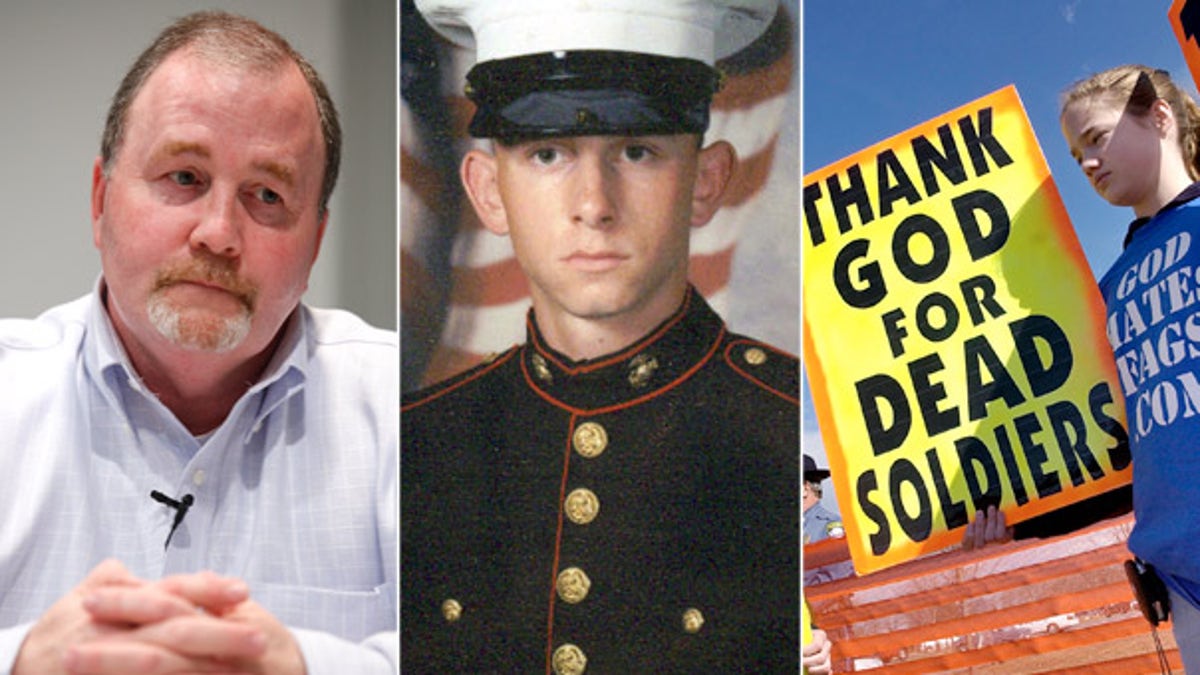
FILE: Albert Snyder, left, is the father of Lance Cpl. Matthew Snyder, center, whose funeral was picketed by members of the Westboro Baptist Church, which is vowing to hold protests at the funeral of 9-year-old Christina Green, who was killed by a gunman during a public meeting with Arizona Rep. Gabrielle Giffords in Tucson last weekend. (AP photos)
For a case that offers many different points of interest, it isn't surprising that Wednesday's First Amendment showdown over military funeral protests seemingly produced as many areas of inquiry from the justices.
However, following the hour-long argument, it appears the U.S. Supreme Court may ultimately issue an opinion that sides against Albert Snyder, the Maryland man who sued the parishioners of a controversial church that protested his son's funeral.
Justice Antonin Scalia cast doubt on the Snyder lawsuit early in the argument because it not only included claims against the funeral protest but also a web posting made a month after the funeral.
"What does that have to do with the funeral," Scalia asked. That's one of the problems I have with the case.
Soon after, Justice Ruth Bader Ginsburg -- who seemed most favorably disposed to the free speech arguments made by the Westboro Baptist Church -- wondered how Snyder could have a claim when no Maryland criminal law was broken during the March 2006 protest. She then put the onus on the Snyder family, suggesting they could have sought an injunction against the protesters if they didn't want them at the church for the funeral of Matthew Snyder, a Marine who was killed in Iraq.
Justice Samuel Alito focused on the intent behind the signs held by the protesters, including one that said, "God Hates You." There has been disagreement in lower courts about whether that sign was directed specifically at a member of the Snyder family or was a more generalized statement of hyperbole.
Alito pointed to the web posting, called "The Burden of Marine Lance Cpl. Matthew A. Snyder," as proof that the signs were targeted. The distinction is significant because if the court decides that the protesters were directing their comments to a specific person then that increases the potential for liability on the picketers. Of the other justices, only Chief Justice John Roberts seemed inclined to pick up on this matter.
Snyder's attorney, Sean Summers, pressed the argument made in his brief to the court that the funeral protest was an unnecessary forum for the protest and the First Amendment shouldn't be used as cover for disrupting a funeral. “We are talking about a funeral. If context is ever going to matter, it has to matter in the context of a funeral. Mr. Snyder simply wanted to bury his son in a private, dignified manner. When the Respondent's behavior made that impossible, Mr. Snyder was entitled to turn to the tort law of the State of Maryland,” Summers told the court.
Margie Phelps, the daughter of church founder Fred Phelps, represented the church and told the court the protest was done with "great circumspection" and within the boundaries of Supreme Court precedents.
Several of the justices suggested hypothetical situations trying to determine at what point do free speech concerns give way to privacy rights. Alito and Chief Justice John Roberts pressed Phelps about what protections a mourning grandmother could expect from someone saying terrible things about her deceased grandson.
Justice Elena Kagan wondered what would happen if someone was targeted for protests at their home, business and other locations. She asked Phelps if that person would have a viable lawsuit in that instance. "My answer, Justice Kagan, is: No, I don't believe that that person should have a cause of action or would under your cases have a cause of action," Phelps replied, so long as the protests could not be considered stalking or confrontational.
The justices appeared to be having difficulty settling on a standard that would simultaneously respect the sanctity of funerals while upholding free speech rights with the latter concern apparently holding a higher priority.
An opinion is expected early next year.












































